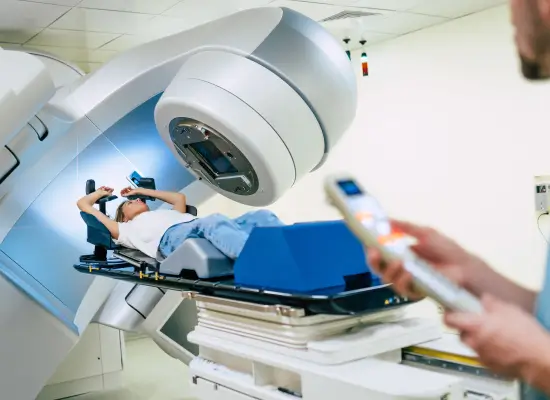Advanced radiotherapy is typically performed on cancer patients to reduce the toxicity of radiation and its side effects. Advanced radiotherapy can tailor the radiation beam to the exact shape and size of the tumour, which improves precision.

- Synopsis
- Introduction
- What is Advanced Radiotherapy?
- Types of Advanced Radiotherapy
- Why Choose Advanced Radiotherapy Treatment?
- Preparation for Advanced Radiotherapy
- Advanced Radiotherapy Procedure
- Recovery & Aftercare
- Risk and Complications after Advanced Radiotherapy
- Why Choose Gleneagles Hospital for Advanced Radiotherapy?
Synopsis
Advanced radiotherapy is a modern treatment method that treats cancer by delivering high-dose of precise radiation to kill the cancer cells. It aims to preserve healthy tissues and organs as much as possible. It has fewer side effects and complications.
Introduction
Advanced radiotherapy, available at Gleneagles Hospitals, refers to modern and highly precise radiation therapy techniques that target the tumours using sophisticated technology and seek to minimise damage in the surrounding healthy tissues. Choose Gleneagles Hospitals for highly sophisticated radiotherapy treatment.
What is Advanced Radiotherapy?
Advanced radiotherapy is typically performed on cancer patients to reduce the toxicity of radiation and its side effects. Advanced radiotherapy can tailor the radiation beam to the exact shape and size of the tumour, which improves precision. Since healthy tissues are spared in the process, it can potentially reduce side effects. It also uses cutting-edge computer systems to deliver the radiation in a highly controlled manner.
Advanced radiotherapy improves treatment outcomes with greater accuracy than other treatments, reducing treatment times and minimising the side effects.
Types of Advanced Radiotherapy
There are many types of radiotherapy treatment that treat various types of cancer with effectiveness.
- External Beam Radiation Therapy (EBRT): In this method, radiation beams are targeted at the tumour from outside of the body.
- Internal Radiation Therapy (Brachytherapy): This method involves putting radioactive sources directly inside or near the tumour.
- Intensity-Modulated Radiation Therapy (IMRT): This method adjusts the radiation beam to the shape of the tumour.
Image-Guided Radiation Therapy (IGRT): This method uses real-time imaging during the treatment to precisely target the tumours. - Stereotactic Radiosurgery (SRS) and Stereotactic Body Radiation Therapy (SBRT): It delivers radiation that is focused on smaller tumours.
Your health matters – get expert advice today.
Why Choose Advanced Radiotherapy Treatment?
Doctors generally recommend advanced radiotherapy centres for higher precision and effectiveness in cancer treatments. This treatment modality can kill cancer cells while preserving the healthy surrounding tissues.
- Brain Cancer: Advanced radiation therapy can treat brain cancers while preserving the healthy tissues and minimising cognitive effects.
- Head and Neck Cancer: Brachytherapy has been proven highly effective in head and neck cancers.
- Prostate Cancer: Volumetric modulated arc therapy (VMAT) is the preferred treatment method for prostate cancer.
- Liver Cancer: Advanced radiation therapy, combined with other treatments, can bring good results for people suffering from liver cancer.
- Lymphoma: Advanced radiotherapy helps destroy the cancer cells and reduces the risk of recurrence.
Preparation for Advanced Radiotherapy
Since advanced radiation therapy uses high dosages of radiation, it is important to be prepared for the procedure for minimal risks and side effects.
- Initial Consultation & Assessment: An initial consultation will be planned with the oncologist, who will determine whether you can benefit from advanced radiation therapy.
- Simulation & Treatment Planning: A CT scan will be performed to understand the location of the tumour. Immobilisation devices like masks or moulds might be used to keep the patient still during the procedure.
- Skin Marking & Tattooing: Small permanent tattoos or temporary skin marks will help position the patient better in each treatment.
- Diet & Hydration Guidelines: Typically, patients would need dietary adjustments to maintain strength during the treatment and its side effects. Staying hydrated is essential for better recovery.
- Medication Review: If the patient is taking anticoagulants or immunosuppressants, a doctor may adjust the medications before the advanced radiation therapy.
- Bowel & Bladder Preparation: In pelvic radiotherapy, patients might be asked to fill or empty their bladder for higher treatment accuracy.
- Dental Checkup (for Head & Neck Radiation): A dental assessment is recommended for head and neck radiation to avoid tooth decay and infections.
- Skin Care Precautions: You will be recommended to avoid harsh soaps, perfumes, or sun exposure to prevent skin irritation.

Advanced Radiotherapy Procedure
Radiotherapy centres have advanced radiology labs that can safely perform advanced radiotherapy. Understanding the Radiation Therapy treatment helps with pre-treatment anxiety and helps you be prepared.
- Pre-Treatment Planning: An oncologist will assess and evaluate your medical history, imaging test results, and overall health before making recommendations for this treatment. A CT or MRI scan might be recommended to understand the location of the tumour as well as the surrounding tissues for precise targeting. A team of specialist radiation oncologists will design personalised treatment plans using computer-based software.
- Radiation Delivery: The treatment starts by positioning the patient on the treatment table according to simulation marks or skin tattoos. An advanced image-guiding technique is used to ensure precise targeting of tumours in each treatment session.
- Post-Treatment Care: You will be kept under observation to monitor for potential side effects like fatigue, skin irritation, nausea, and localised discomfort. They can usually be managed with support and medical care. Counselling and nutritional guidance will be required for emotional and physical well-being.
Recovery & Aftercare
Immediately after the treatment, you will be monitored for complications and side effects like fatigue, skin irritation, nausea, or localised discomfort. A balanced diet of protein and fluids will be recommended to help you recover from the treatment process and gain strength. Mild pain relievers might be recommended to deal with discomfort. You will be recommended to use gentle skincare, avoid harsh soaps, and protect treatment areas against sunlight to avoid irritating your skin. Since the treatment area is sensitive, avoid scratching or rubbing and wear loose clothes for comfort.
You will need to do follow-up checkups and visits with your oncologist and radiation specialist to understand treatment progress and adjust the treatment accordingly. You will be recommended regular exercises to help you stay energetic. Quitting harmful habits like smoking or alcohol will aid in recovery.
Risk and Complications after Advanced Radiotherapy
Even though radiation therapy has few side effects compared to conventional cancer treatments, there are still certain risks and complications present, like any other medical procedure. Here are some of the risk factors related to advanced radiotherapy.
Short-Term (Acute) Side Effects
- Fatigue: Fatigue is a common symptom after advanced radiotherapy and can last for weeks on end.
- Skin Reactions: Many patients experience redness, dryness, peeling, or blistering in the treatment area.
- Nausea & Vomiting: It is especially common with radiation targeting abdominal or brain cancers.
- Hair Loss: Hair loss can occur in the treated area.
- Bowel & Bladder Changes: In case of pelvic radiation, you might experience diarrhoea, constipation, or urinary discomfort.
Long-Term (Chronic) Complications
- Fibrosis (Tissue Hardening): It may cause stiffness and pain in the treated area.
- Hormonal Changes: You may experience hormonal disbalance if the radiation is near glands like the thyroid, ovaries, or testes.
- Nerve Damage: It can cause numbness, tingling, and lack of function in the affected area.
- Cognitive Effects (For Brain Radiation): In brain radiation, you may experience cognitive side effects like memory issues, difficulty concentrating, and mood changes.
- Heart & Lung Complications: Radiation near the chest might increase the risk of heart disease and lung fibrosis.
Why Choose Gleneagles Hospital for Advanced Radiotherapy?
Gleneagles Hospitals is globally recognised for advanced radiation therapy to treat complex cancers effectively. We are equipped with cutting-edge radiotherapy technologies and highly experienced oncology specialists who personalise treatment plans for each patient. We provide counselling and dietary guidance for pre- and post-radiotherapy care.
- Expert Specialists: Our team of medical oncologists, radiation specialists, and rehabilitation experts provides comprehensive care.
- State-of-the-Art Facilities: The hospital is equipped with advanced radiation labs and computer-based tools for higher precision.
- Minimally Invasive Techniques: Advanced radiotherapy is minimally invasive and has very few side effects.
World-Class Infrastructure: Our modern recovery units and rehabilitation centres ensure the comfort of patients. - High Success Rate: Gleneagles Hospitals has seen a remarkable success rate over the years, transforming countless lives.
Frequently Asked Questions
Advanced radiotherapy uses precise radiation delivery techniques to target the tumour while preserving healthy tissues and organs. It reduces toxicity and side effects.
Some advanced radiotherapy treatments are Intensity-Modulated Radiation Therapy (IMRT), Image-Guided Radiation Therapy (IGRT), and Volumetric Modulated Arc Therapy (VMAT).
Doctors generally recommend advanced radiotherapy centres for higher precision and effectiveness in cancer treatments.
Fatigue, skin reaction, hair loss, and nausea are the most common side effects of advanced radiotherapy. Many can also develop fibrosis, hormonal changes, and cognitive effects.












